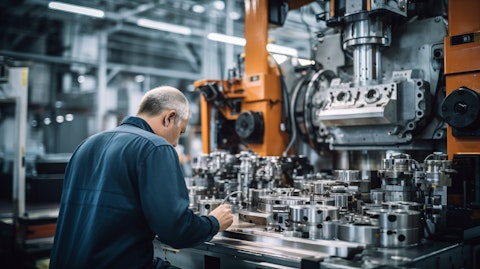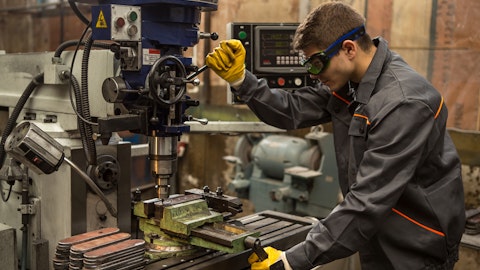Enerpac Tool Group Corp. (NYSE:EPAC) Q2 2024 Earnings Call Transcript March 21, 2024
Enerpac Tool Group Corp. isn’t one of the 30 most popular stocks among hedge funds at the end of the third quarter (see the details here).
Operator: Ladies and gentlemen, thank you for standing by. Welcome to the Enerpac Tool Group’s Second Quarter Fiscal 2024 Earnings Conference Call. As a reminder, this conference is being recorded, March 21, 2024. It’s now my pleasure to turn the conference over to Travis Williams, Director of Investor Relations. Please go ahead, Mr. Williams.
Travis Williams: Thank you, operator. Good morning, and thank you for joining us for Enerpac Tool Group’s second quarter fiscal 2024 earnings call. On the call today to present the company’s results are Paul Sternlieb, President and Chief Executive Officer, and Shannon Burns, our Interim Principal Financial Officer. Our slides and recording of today’s call will be available on the Enerpac website in the Investors section. Today’s call, we’ll reference non-GAAP measures. You can find a reconciliation of GAAP to non-GAAP measures in the press release issued yesterday. Our comments will also include forward-looking statements that are subject to business risks that could cause actual results to be materially different. Those risks include matters noted in our latest SEC filings. Now, I will turn the call over to Paul.
Paul Sternlieb: Thanks Travis, and good morning everyone. Enerpac posted another solid quarter despite the broader macro environment and the overall slowdown in the industrial sector. We were particularly pleased with the second quarter margin expansion as we made further progress in improving our operating efficiency and SG&A productivity. Moreover, we believe organic sales growth in our Industrial Tools & Services, or IT&S segment, of 3% continues to outpace the marketplace. At the halfway point in fiscal 2024, with organic revenue growth of 4%, and adjusted EBITDA growth of 18%, we remain on track to achieve our full year guidance. And we continue to make solid progress toward our longer term goals as we take Enerpac to the next level of growth and profitability.
I’d like to welcome Shannon Burns to the call. Shannon is serving as our Interim CFO as we continue the search process. He is a seasoned finance executive who leads Enerpac’s business decision support office and brings financial leadership experience from several other major corporations. I’ll let Shannon review our second quarter performance. Then I will speak about geographic trends, product innovation, and a few key initiatives that will continue to advance Enerpac’s progress as a premier industrial solutions provider. Shannon?
Shannon Burns: Thanks, Paul. Paul mentioned our team executed another solid quarter within our Industrial Tools & Services business, enjoying top line growth of 2.8% with a 3.7% increase in product revenue and a 0.8% decline in services. Service revenue declined slightly from a year ago period, largely driven by some specific one-time projects work in the prior year. In addition, through our 80/20 approach, we continue to focus on higher quality, more differentiated projects and service lines. IT&S growth was partially offset by a 25% decline at Cortland Biomedical. As we finalize commercial negotiations with a key Cortland customer, some shipments were temporarily on hold. We concluded the negotiations and shipments resumed at the end of the second quarter.
Additionally, there has been some softness in demand related to certain surgical procedures utilizing Cortland products. However, on a midterm basis, there’s a promising funnel of commercial opportunities to offset the softness. We remain bullish on the outlook for the Cortland Biomedical business, given its differentiated offerings and exceptional innovation, coupled with the favorable macro trends driving long-term demand for Cortland’s technology in the medical device sector. Due to the sale of Cortland Industrial in late fiscal 2023, total net sales for the company declined 2.5% year-over-year. On an organic basis, which excludes the divestitures and the impact of foreign exchange, sales increased 1.8%. Slide five reflects the continued progress we’ve made improving operating efficiency and SG&A productivity.
In the second quarter, gross margins expanded approximately 200 basis points year-over-year to 51.6% despite the aforementioned volume-driven decline at Cortland Biomedical. The improvement in margins was driven by operational improvements related to the ASCEND transformation as well as pricing actions of favorable sales mix and the disposition of Cortland Industrial. Similarly, we continue to benefit from the initiatives that improved our SG&A efficiency. Adjusted SG&A expense, which excludes ASCEND and other one-time charges from both periods, declined 3% year-over-year as we continue to responsibly manage discretionary spending. As expected, ASCEND and other one-time charges have declined substantially. Turning to slide six, with both top line growth and continued gains in operating efficiency and SG&A productivity, adjusted EBITDA increased 6.4% year-over-year.
Adjusted EBITDA margins improved 210 basis points from 22.7% to 24.8%. On a GAAP basis, diluted earnings per share from continuing operations totaled $0.33 in the quarter. Adjusted EPS for the quarter was $0.36 compared to $0.35 in the prior year, as the benefit of a lower share count was offset by a significantly higher effective tax rate. The higher tax rate in the second quarter of fiscal 2024 was primarily due to lower ASCEND charges as well as our efforts to repatriate cash during the quarter. We continue to expect the full year adjusted tax rate to be in the range provided by our guidance. In the second quarter of fiscal 2024, cash provided by operations was $13 million compared to a use of cash of $8 million in the year ago period. The improvement was primarily due to the timing of annual incentive compensation payments, lower ASCEND transformation payments as well as higher net earnings.

In addition, we continue to drive improvements in working capital management and, in particular, inventory efficiency. As we have discussed, Enerpac’s liquidity and balance sheet remains strong. At the end of the second quarter, net debt was $91 million, resulting in a net debt leverage ratio of 0.7 times adjusted EBITDA, down from 0.9 times at the end of last quarter. Total liquidity was approximately $500 million. Additionally, as we’ve said previously, we have the option in the credit facility to request an M&A accordion up to $300 million. We remain focused on a disciplined strategy related to deploying capital to enhance returns. With that, let me turn the call back to Paul.
Paul Sternlieb: Thanks, Shannon. Turning to the regional performance of IT&S. In the Americas, we saw a low single digit growth in the quarter. As we said in the prior quarter, we expect low single digit growth in the Americas in 2024, given the neutral to cautious sentiment amongst our channel partners. While inventory levels are above average and a few distributors, our Heavy Lifting Technology business, or HLT, has a solid funnel going into the third quarter and the service business is starting the quarter with a strong backlog and momentum. In the EMEA region, we saw solid mid single digit growth in the quarter. We are enjoying strength across our targeted vertical markets, including wind and industrial MRO with particular strength in the infrastructure vertical, driven by increasing government investment in large projects and our direct sales approach with engineering and construction companies.
Distributor inventory in the region is appropriate, although sentiment remains cautious due to weaker trends in the general industrial market. The Asia-Pacific region saw a low single digit decline in the quarter. We enjoyed over 20% revenue growth for our standard products in the region. However, HLT, which can be very lumpy, was down sharply from a year ago period, which included a large project in Australia. Dealer sentiment is neutral to cautious while inventory in the channel is generally appropriate, albeit with some pockets of elevated levels. On the innovation front, we are very pleased with the flow of new products generated by our disciplined, customer-focused product development process. Last quarter, we discussed the launch of two new battery-powered portable pumps that we believe have clear competitive advantages in our key vertical end markets.
I’m pleased to say that these pumps are being well received in the marketplace with sales tracking ahead of plan. This quarter, we launched a new 100-ton hydraulic lock-grip puller. The puller provides a safe and productive way to remove large shaft mounted components without damage and is a meaningful addition to our product portfolio for railcar maintenance. We also launched a new pin puller in the Americas, the PPH-Series 40-ton hydraulic pin puller kits provide a safe and easy way to remove joint pins used in mining, on and off-highway vehicles and equipment found in manufacturing facilities. And by using hydraulic force, the pin puller replaces more dangerous methods that involve torturing, lancing or hammering. All of these new products support Enerpac’s mission of making complex often hazardous jobs possible safely and efficiently.
And speaking of our ability to handle critical jobs, Enerpac’s Cube Jacks were recently used to move the retired Space Shuttle Endeavor to its permanent display location at the California Science Center. We were proud to be involved in this unique and highly complex move. This is yet another example of the application of Enerpac’s world-class products and technology to help customers solve challenging problems. In the second quarter, we began the rollout of our Enerpac Commercial Excellence, or ECX, program in the Americas. As you may recall, early on, we realigned our salesforce to optimize coverage. We also modified our incentive compensation structure to reward regional performance, but we believe there is additional and significant room for improvement in terms of commercial effectiveness with ECX.
ECX significantly raises the bar with a proprietary disciplined playbook, tools and support for the sales process, including everything from market segmentation to account planning and tracking. With ECX, we will also optimize the potential of our CRM platform and integrate with our financial systems to improve forecasting and business intelligence. As a result, we expect to achieve better line of sight on business opportunities, including key leading indicators and deepen our relationships with channel partners and end users. We see this as a meaningful step in improving our overall commercial effectiveness by driving stronger growth in our sales funnel and improving the overall conversion and win rate. As I mentioned, rollout is well underway in the Americas with EMEA and Asia-Pacific regions to follow.
Finally, as you may have seen on our website, we have announced plans to relocate our corporate headquarters from the suburb of Menomonee Falls to a new location in downtown Milwaukee by early 2025. The new space located in the vibrant downtown business district will be right-sized for our approximately 130-person Milwaukee area workforce and remodel to suit our needs. With its proximity to many local amenities, the new location should enhance our ability to attract and retain top talent as well as inspire strong collaboration and innovation. We are particularly excited to be part of a return to and revitalization of the downtown Milwaukee area. In addition, the move will be financially beneficial for Enerpac. Speaking of our workforce and our headquarters and around the globe, I’d like to express my deepest thanks to our team for all their hard work in taking Enerpac to the next level of growth and profitability and serving our customers with world-class products and services every day.
With that, we’d be happy to take questions.
See also 20 Lowest Paying Countries for Doctors and 15 Highest Paying Countries for Automotive Engineers.
Q&A Session
Follow Enerpac Tool Group Corp (NYSE:EPAC)
Follow Enerpac Tool Group Corp (NYSE:EPAC)
Receive real-time insider trading and news alerts
Operator: Thank you. We will now be conducting a question-and-answer session. [Operator Instructions] Our first question comes from Tom Hayes from CL King. Please proceed.
Tom Hayes: Hey, good morning, Paul. Thanks for taking the questions. Can you hear me? Can you hear me, guys?
Paul Sternlieb: We can hear you. Yes. Good morning.
Tom Hayes: Good morning. Hey, Paul, I was just wondering if you could give us kind of a big picture outlook on the industrial activity. I think in your release yesterday, you called out at least in the opening kind of a slowing industrial activity levels. Maybe kind of discuss what you saw coming out of Q1 and kind of what you’re seeing now? I think that would be helpful.
Paul Sternlieb: Sure. Thanks, Tom. Yeah. I think we certainly enjoyed some nice organic growth in Q1. Obviously, sequentially, you saw that slow a bit here in Q2. I think, what we saw in the marketplace, there are kind of some mixed signals. We did reference in our comments here earlier that there still remains, I’d say, quite a bit of kind of cautionary tone from some of our distributors across the regions, frankly. I’m not sure that’s entirely new. We’ve talked about that now for several quarters. In some pockets, there are elevated levels of inventory. And then certainly, some of the market data that we subscribe to and then just what we see our own data would indicate there is some slowness generally speaking, in the broader industrial market, not just for Enerpac, but more broadly.
So, I think we remain kind of cautious there, but we’re still firm in reaffirming our outlook for the full year. As you can see through the first half, we’re kind of close to the higher end of our full year organic growth guidance, the 2% to 4%. And so at this point, we see no reason to modify that.
Tom Hayes: No, I appreciate that. And then maybe on the geographic front, I think I just want to make sure I kind of understood it right. It sounds like on the APAC region, it was more the low single digit declines was more the Australian customer-driven versus some broad change in demand. Did I get that right?
Paul Sternlieb: Yeah. I think in Asia-Pac, we actually saw pretty nice growth in what I would call the core aspect of our business, we call our standard products. We referenced over 20% growth in the quarter in Asia-Pac. But we do have a reasonable amount of sales in Asia-Pacific for our Heavy Lifting Technology, or HLT, business. That’s basically capital equipment. It does tend to be lumpier. And we were lapping Q2 last year that had some pretty strong sales for HLT in Asia-Pacific. So that’s what drove the kind of low single digit decline, but we still see generally good, I’d say, market conditions and help otherwise in the region.
Tom Hayes: Okay. Great. Maybe a couple more. One, maybe kind of discuss what you’re seeing on two of your growth pillars, the rail and the wind. I think we — some of our challenge actually getting a little bit of mixed messages as far as the levels of activity there, just wanted to see what you guys are seeing?
Paul Sternlieb: Sure. Yeah. As you mentioned, that’s one of our four key growth pillars is our focus on the select set of verticals, which, to your point, includes rail and wind, amongst others, but also infrastructure and industrial MRO. I’d say in the rail and wind sectors, if I take them in turn, I think in rail, we still see very promising opportunities. We did a very small kind of acquisitions late — last fiscal Track Tools to add to our portfolio. We referenced here in the call today. We continue to drive forward on our innovation pipeline in the rail sector, including the launch of one of our new products this quarter. The engagement levels with customers in the rail sector remains robust, including a lot of good conversations with Class 1 operators.
And I think given the investments that are going on more broadly in the rail sector, including some of the government investments, obviously, for safety and build out of infrastructure. We still feel very good about the kind of macro fundamentals in the rail sector generally. I think in wind, likewise, we continue to build our funnel there and work on innovation in that space. And although, I would say there probably has been a slowdown in wind over the last six to 12 months. I think we see some green shoots of recovery. We do believe that’s temporal, given some of the issues that — particularly some of the OEMs in that sector faced over the last year. But the demand profile still remains the need for clean energy and the transition to clean energy still remains.
We believe that’s one of the best place technologies to address that need. And so, we remain very focused on driving forward on the work we’re doing and the activity we’re doing in the wind sector.
Tom Hayes: I appreciate the color. Maybe two more, if I could. One, I noticed your service revenue was down year-over-year. Just wondering was — because I believe — I didn’t go back and double check, but I think Q1 was up nicely. Was that just a timing or a seasonal issue?
Paul Sternlieb: Yeah. I think there is a bit of timing to it, Tom. Generally speaking, our service business remains healthy. Actually, I think we referenced in our comments, we’re entering this quarter with some nice momentum in backlog. So, we still feel good about where we are. It was in one of our regions only where we saw some decline. But I would say it’s more specific to particular opportunities than it is anything systemic truly.
Shannon Burns: Yeah. And I also mentioned in the comments that our 80/20 philosophy, we’re still working through some of that this quarter and that did have an impact.
Tom Hayes: I appreciate that. I’ll jump back in the queue. Thanks, guys.
Paul Sternlieb: Okay. Thank you.
Operator: Our next question comes from Steve Silver from Argus Research. Please proceed.



